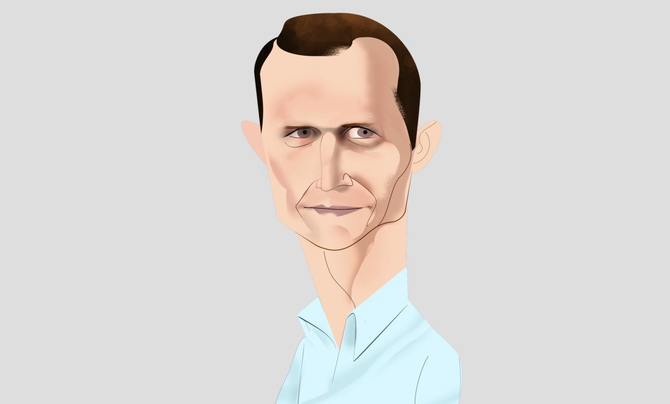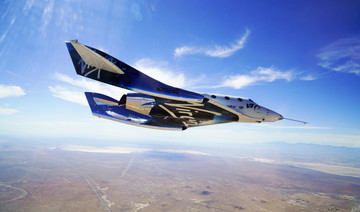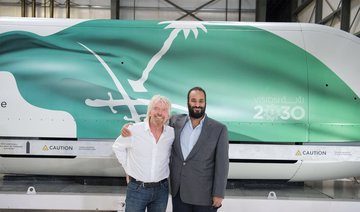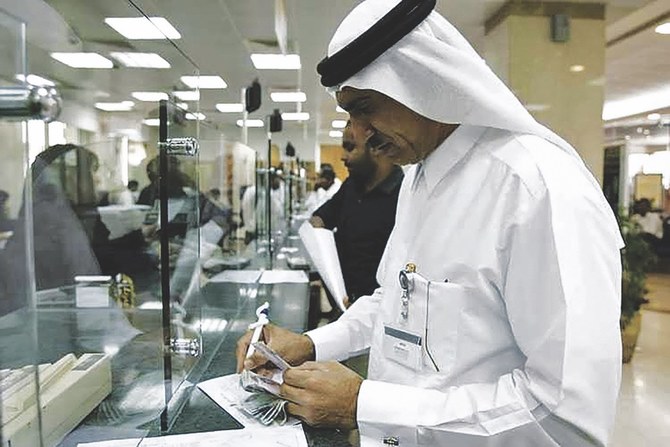DUBAI: On a crisp sunny December day in California’s Mojave desert, stood nervously on the edge of the runway waiting for the SpaceShipTwo spacecraft to begin its takeoff on a test mission into space.
The former NASA chief-of-staff was joined by company founder and billionaire Richard Branson, who had brought his son along for the launch, and they gathered with other colleagues and family members of those involved in what was to become a ground-breaking test flight to send a commercial spaceship designed to carry private passengers into space for the first time.
“It was pretty intense right before the flight,” Whitesides said. “You could tell people had that mixture of excitement and nervousness that you always have over a major flight test milestone,” he said, joking he was as nervous as he had been before his wife gave birth to their first child.
“We had all the staff that built the vehicle and maintained the vehicle and many of their families came — and it was in some ways a family affair,” he said.
It was the fourth test flight for the vehicle, SpaceShipTwo — VSS Unity having completed ground tests and glide tests. The ship took off and was carried into the air by another carrier aircraft before it was blasted into space by the force of the rocket burn.
Traveling at almost three times the speed of sound and reaching a height of 51 miles above earth, VSS Unity officially entered space — as defined by US standards — for the first time.
The flight, piloted by Mark “Forger” Stucky and Frederick “CJ” Sturkow, lasted around 1 hour 15 mins, before returning to Earth and landing in front of the now extremely jubilant crowd of onlookers.
“The announcer started calling out — it’s burned for 10 seconds, 20 seconds, 30 seconds and the excitement was just building and building as the flight got higher and higher,” said Whitesides.
“Finally, the announcer said that the vehicle had reached space, and there was this great release of tension and excitement, and a cheer went out. It was the most amazing thing I’ve ever been part of — it was an incredible moment in time.”
He said when the pilots landed, they came out of the craft “looking cool as cucumbers and as if they just went down to the corner store to buy milk.
“But there was a lot of emotion when they were greeted by their spouses and kids,” he said.
The two pilots earned their “Astronaut Wings” from the US aviation agency FAA Commercial after the flight. The decorations will be officially awarded in a ceremony in Washington next year.
The successful mission not only marked the first human spaceflight to be launched from US soil since the final space mission in 2011, but was also the first time a crewed ship designed for commercial passenger service had reached space.
It is a major step forward for Virgin Galactic’s ambitions to take private citizens into space as tourists.
Virgin Galactic was established as an arm of the Virgin Group by Branson in 2004, and he has faced numerous setbacks in his pursuit of developing space tourism. This culminated in October 2014, when a test vehicle broke apart in flight and killed the co-pilot and left the pilot seriously injured.
For both Branson and Whitesides, the achievement of the test flight on Dec. 13 represented the realization of their childhood aspirations.
“I’ve always wanted to go to space to be honest — in some ways this is the perfect thing. I get to go to space but also help others get to space,” Whitesides said.
-------
BIO
CAREER
- Chief-of-staff for NASA; on leaving he received the Distinguished Service Medal, the agency’s highest award.
- Currently CEO of Virgin Galactic, Sir Richard Branson’s human spaceflight venture, and the Spaceship Company, a manufacturer of advanced space vehicles.
EDUCATION
- Princeton University’s Woodrow Wilson School
- University of Cambridge
- Fulbright Scholarship to Tunisia
FAMILY
- Lives in California with his wife Loretta and two children
--------
“I grew up in the mid-1970s just after the Apollo program, and was really inspired by what was doing. I remember when I was 11 or 12 looking up, thinking I wanted to go up to space one day, and I have always had that dream,” he said, reflecting on his childhood growing up outside Boston in the US.
Whitesides pursued his early interest in space, first studying at Princeton University’s Woodrow Wilson School before earning a master’s degree in geographic information systems and remote sensing from the University of Cambridge.
His studies took him to work for the US space agency NASA, where be became chief-of-staff. On leaving he was awarded a medal for Distinguished Service, the highest award granted by the agency.
While at the agency, the Virgin Galactic project caught his eye, and he and his wife, Loretta — who also has a passion for space travel — were among the first customers to buy tickets in 2005 for Virgin Galactic’s planned commercial spaceship. This purchase paved the way to his appointment as CEO of the
venture in 2010.
Around the same time, the UAE also took an interest in the project, with the Gulf state initially taking a 31.8 percent stake in 2010, rising to a 37.8 percent the following year. The stake is currently held by the state-owned Mubadala Investment Company.
More recently there had been talks between Branson and Saudi Arabia about a potential $1 billion investment in the project by the Kingdom. Following the murder of Saudi journalist Jamal Khashoggi in October, however, Branson announced he had suspended talks with the Kingdom. Whitesides was unable to comment further on the current state of relations with Saudi Arabia.
Beyond the excitement and exhilaration of launching rockets beyond the Earth’s atmosphere, Whitesides is motivated by the profound impact the Galactic project and space travel could have on humanity as a whole.
“What inspires me is the idea of planetary perspective, the perspective when you go up in space. It is really important for the world to have that right now. If we can take a bunch of leaders from all over the world — some of them commercial leaders, some political leaders and some will be everyday citizens — and take them up into space, we can show them the planet.
“Show them how we are on this relatively fragile rock and you know we need to work together to solve some of our biggest problems. That is very inspiring to me. That is what motivates me. That space perspective is so important to our future,” he said.
Whitesides described photographs taken during the latest mission as “spectacular,” explaining that you can see the “blue marble under the thin atmosphere and
the wonderful beauty of planet Earth below.”
More than 600 people are already on the waiting list for the first commercial flights, all eager to see these views for themselves. Celebrities such as Leonardo diCaprio and pop star Justin Bieber are said to be among those who have bought tickets.
Since the latest test flight, interest has only heightened in getting a seat on the spaceship, Whitesides said, noting the importance of these first pioneers of space tourism.
“They have a special sparkle in their eye about doing new things and being at the forefront,” he said. “Without them we wouldn’t have the evidence of that large potential market out there,” he said.
Technology used for SpaceShipTwo ensures that the aircraft are reusable, Whitesides said, which is key to making this venture commercially viable. Typically spacecraft are abandoned after use one or two times, while the SpaceShipTwo model aims to operate more like a commercial jumbo jet and reused
multiple times.
“If you take a 747 across the Atlantic, that ticket is affordable because the airplane itself is reused thousands of times. So the key, really, to lowering the cost of space and enabling the benefits of space to be experienced more broadly by people around the world is to enable reusability.
“That’s what we have been working on so hard for SpaceShipTwo — to create a vehicle that can be reused not twice or three times or five times but 100 times for years and years,” he said.
Whitesides is optimistic there is demand for space travel, and that it will only grow once the first few successful journeys are completed.
“The number of people who would want to go to space is huge. I speak all over the world and I ask audiences everywhere who would like to go to space — and almost always I see most of the hands go up,” he said.
“There are a lot of people who want to go up, but they want to see it demonstrated first,” he said.
The current SpaceShipTwo vehicle is designed only to take people up to space and back.
However, Whitesides said that the next step would be to create new spacecraft models capable of high-speed space travel between continents.
“What is amazing in a sort of surprising way is that we have been going at roughly the same speed in terms of jet travel for almost 50 years — which is about Mach 0.8,” he said.
“Our children or grandchildren will be surprised that we got on planes to fly for 12 hours or 15 hours between continents. They will get used to much higher speed transportation,” he said.
Following the latest launch, they will start installing the customer interiors — these are ready and waiting to be installed in the craft.
“We are really on the home stretch here,” he said. “We need to fly a few flights … with our staff on board in the back — and those flights will allow us to make sure our customer experience is terrific and everyone is well trained. I would hesitate to give a specific date, but I think we are getting pretty close.”
Further developments with Virgin Galactic’s existing tie-up with the UAE are in the pipeline as well, with talks about developing a spaceport in the Gulf state to send people to space at an “exciting” stage.
The UAE is keen to develop its space industry, having set up its own space agency in 2014 and aiming to send the first Emirati astronaut to the international space station next year.
“What you may see in the coming period of time are discussions and announcements around the formation of a small number of space ports (around the world),” he said. Initially these will be used to send ships to space and back down again before potentially forming the basis for a network for intercontinental space travel.
Italy is one of the already publicly disclosed locations for a potential spaceport, while “the UAE in many respects is the furthest along, so that is exciting,” he said.

















